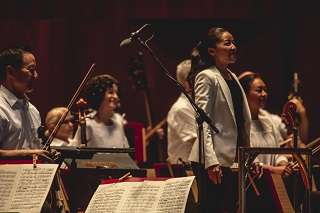|
Back
The Fabulous Philadelphians ‘Tchaikovsky Spectacular’ truly was Philadelphia
The Mann Center for the Performance Arts
07/22/2021 -
Peter Ilyich Tchaikovsky: Polonaise from Eugene Onegin, Op. 24 – Selections from Swan Lake, Op. 20 – Rococo Variations, Op. 33 – 1812 Overture, Op. 49
Hai-Ye Ni (cello)
The Philadelphia Orchestra, Erina Yashima (conductor)

E. Yashima (© Courtesy of the Philadelphia Orchestra)
Returning to the stage after 16 months, the full Philadelphia Orchestra returned to the Mann Center for the Performing Arts to play their popular ‘Tchaikovsky Spectacular’ program and music lovers swarmed the venue after not hearing the orchestra live for 16 months of industry lockdown.
Philadelphia Orchestra’s assistant conductor Erina Yashima led the musicians through a sumptuous program of music by Peter Ilyich Tchaikovsky, whose repertoire has always been so identified with this orchestra, in its 120-year history. It was truly a musical homecoming for this crowd, that filled much of the Pavilion’s main seating and the surrounding lawn.
Conductor Erina Yashima introduced the concert and launched into the dance Polonaise, from Eugene Onegin, that conveys the Polish folkloric invitation to the dance and served as a rousing prelude to this sumptuous concert.
Next, the opening scene from Tchaikovsky’s score to Swan Lake. It was Peter Smith’s silvery oboe solo and Elizabeth Hainen’s ethereal harp that floated through the air on a summer’s breeze that instantly gave this evening a sense of musical occasion.
It is always instructive to hear Swan Lake concertized separate from a ballet production, the tempos for one, are always different from what a ballet maestro will modify in terms of rightly, for the dancers, the technical aspects in the innumerable versions concocted to tell this story ballet.
Yashima leaned into the fiery orchestral drama, the lusty brass heralds, for instance, that are regularly scaled down for the ballet stage lest it overpower the physical production. And on the other end of the score’s musical wonders, the scintillating quieter passages that can be upstaged by the luster, and virtuosity pointe work of a prima ballerina playing the Swan Princess. Yashima brought glittering clarity in the music that scores the iconic ‘Cygnet’ quartet with the ballerinas arms entwined and their pointe work in sharp unison steps.
An exquisite such moments of Tchaikovsky’s timeless musical magic came in this performance during Hainen’s harp and David Kim’s violin duet passages. In the finale sections, Yashima unleashes the most dramatic orchestral crescendo that scores as the evil sorcerer Rothbart crashes in on Prince Siegfried and Odette lakeside is vanquished with scorching brass and cymbals.
The other musical highlight of the night was Principal Cello Hai-Ye Ni as the featured soloist on Tchaikovsky’s Rococo Variations. Ms. Ni’s ease with the ornate baroqueness in the first half is played with unfussy technical precision, that gives way to the lustrous sonorous solo lines that make it virtuosic.
The concert closer is that perennial orchestra warhorse with all of its cannon fire effects booming through the Mann Center’s bucolic amphitheater at full gallop. Tchaikovsky was commissioned to compose it for a Russian Festival and one that became one of his most popular and financially successful works, but one he considered “noisy and without any artistic merit.” To contemporary audiences it points up that, for audiences around the world, his 1812 Overture is proof that Tchaikovsky still rocks.
The detailing and balance that Yashima sustains from the Philadelphians in all of the theatricality and compositional intimacy in an open-air venue was impressive. The weather cooperated temperatures in the low 80s & vitally the humidity finally broke, after being extremely high in the region for a week and a condition that can significantly affect the strings. The event was capped off with a 20-minute pyrotechnical display that always follows the after the concert closer with the musical fireworks of Tchaikovsky’s 1812 Overture.
Lewis Whittington
|